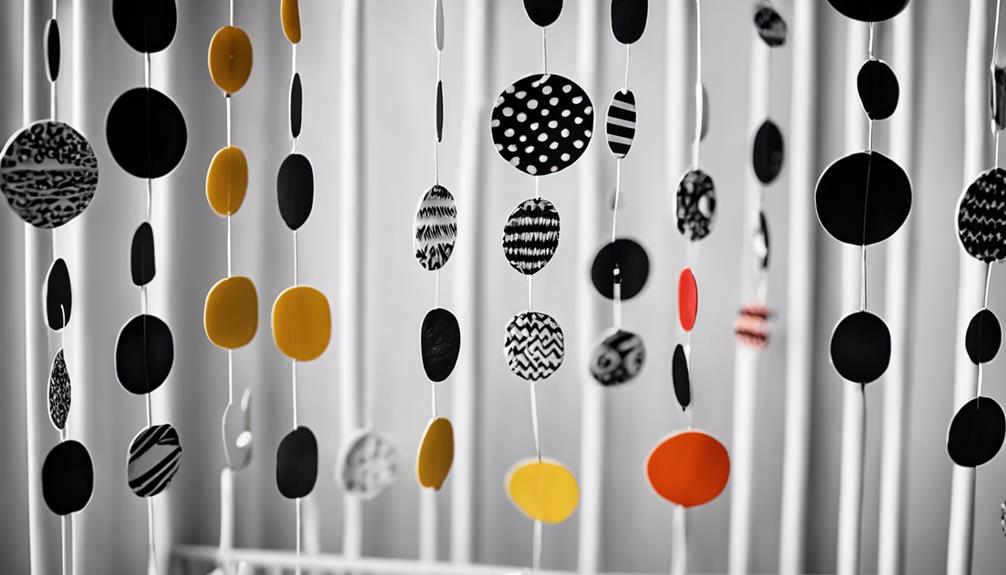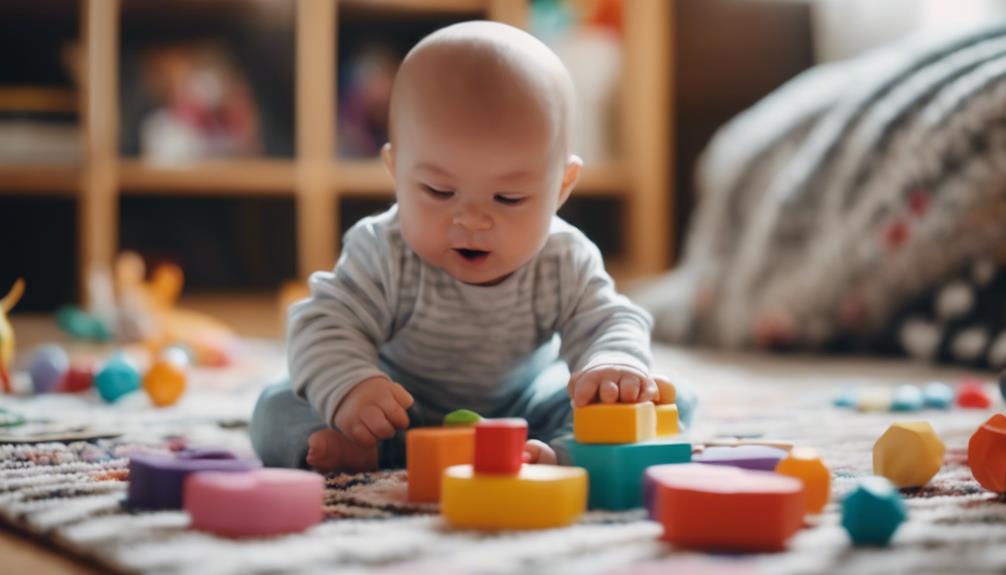To promote a baby’s cognitive and physical development effectively, participate in sensory activities such as music and textured toys. Music aids brain development by providing auditory stimulation. Interactive experiences, like nature walks and pointing out interesting objects, spark curiosity and language abilities. Implement language development strategies like speaking in a soothing tone and using parentese. Storytelling and music strengthen emotional bonds while boosting cognitive growth. Encourage problem-solving skills with toys that stimulate cognitive abilities. Boost visual stimulation with high-contrast images. Playing peek-a-boo can help with brain connections. For more information on these techniques, explore additional ways to support your baby’s development.
Key Takeaways
- Use sensory toys for tactile stimulation and cognitive development.
- Engage in interactive learning experiences with various textures, sounds, and sights.
- Read stories with inflections to foster emotional connections and early literacy.
- Take nature walks to stimulate curiosity and appreciation for the environment.
- Incorporate music and singing to enhance cognitive skills and auditory senses.
Benefits of Music for Babies
Listening to music with your baby can have a significant impact on their cognitive development.
Music plays an essential role in stimulating a baby's brain development, enhancing their auditory senses, and improving cognitive skills. Various genres of music can help in this process, with studies showing a link between listening to music and improved math aptitude in babies. According to experts, incorporating music into daily routines can provide a sensory-rich experience for babies, encouraging rhythmic movement and overall brain development.
Singing songs to your baby during playtime not only fosters a bond but also contributes to their sensory experience. The American Academy of Pediatrics recommends musical activities to support early brain development and sensory integration in infants.
Interactive Errands for Stimulation

Taking your baby on errands like grocery shopping can provide valuable sensory stimulation through exposure to new sights, sounds, and colors.
Visiting different places during errands can ignite your baby's curiosity with new faces and environments. Changing the scenery offers a variety of sensory experiences that can help your baby learn more about the world around them.
Grocery Store Learning
Engaging your baby in interactive errands at the grocery store can provide valuable stimulation for their developing mind and senses. Here's how you can make the most out of your grocery store learning experience:
- Explore New Faces: Introduce your baby to different people at the store, allowing them to observe new faces and expressions, enhancing their social awareness.
- Colorful Stimuli: Point out the vibrant fruits and vegetables, colorful packaging, and various products on the shelves to stimulate your baby's visual senses.
- Auditory Stimulation: Engage in conversations with your baby while shopping, describing the sounds of the store, such as the rustling of bags or the beeping of the checkout, to stimulate their auditory senses.
- Tactile Experiences: Let your baby touch different textures like smooth apples, rough packaging, or crinkly bags, providing tactile stimulation for their developing sense of touch.
Park Playtime
Exploring the park with your baby can provide a dynamic and stimulating environment for sensory development and physical play. Taking advantage of park playtime can greatly benefit your child's overall growth and well-being. Here is a breakdown of how park playtime can help stimulate your baby's mind and body:
| Benefits of Park Playtime |
|---|
| 1. Enhances sensory skills |
| 2. Encourages physical activity |
| 3. Boosts cognitive development |
Engaging in outdoor play allows your baby to interact with various textures, sounds, and sights, which can aid in the development of their sensory abilities. It also provides a space for your child to engage in physical activities, promoting healthy growth and development. Interacting with nature in the park setting can enhance your baby's cognitive skills and curiosity, helping them learn and explore the world around them. So, next time you visit the park, remember that it's not just playtime; it's an essential part of your child's development.
Importance of Storytelling in Development

Storytelling plays an essential role in your baby's development. It enhances cognitive growth, fosters emotional connections through narratives, and boosts language skills.
According to the American Academy of Pediatrics, "Reading to your baby not only promotes brain development but also strengthens your bond."
Storytelling for Cognitive Growth
Enhancing cognitive development in babies can be effectively achieved through the art of storytelling. Storytelling plays an important role in shaping a baby's cognitive growth by enhancing language skills, fostering imagination, and promoting bonding between the caregiver and the baby.
Here are ways storytelling contributes to cognitive development:
- Language Skills: Exposing babies to different words and sounds during storytelling sessions helps in expanding their vocabulary and improving language comprehension.
- Imagination and Creativity: Storytelling stimulates a baby's imagination, encouraging them to think creatively and develop problem-solving skills.
- Bonding: Through shared storytelling experiences, caregivers and babies strengthen their emotional connection, leading to a secure attachment and a sense of comfort.
- Attention Span and Listening Skills: Listening to stories requires focus, which can enhance a baby's attention span and listening abilities over time.
Engaging in storytelling not only benefits cognitive development but also sets the foundation for a lifelong love of reading and learning in babies.
Emotional Connection Through Stories
Fostering an emotional bond through storytelling is an essential element in nurturing a baby's development. Storytelling not only entertains but also creates a strong emotional connection between you and your little one. By engaging in storytelling activities, you're building a foundation for a secure attachment that's important for your baby's overall well-being.
Reading stories with voice inflections plays a significant role in enhancing your baby's language development. The varied tones and expressions you use while storytelling captivate your baby's attention and help them grasp the nuances of language. These bonding moments created through storytelling also strengthen the parent-child relationship, providing a sense of security for your baby.
As you weave tales and introduce different characters and scenarios, you aren't just entertaining but also stimulating your baby's cognitive skills. These early literacy skills lay the groundwork for future learning.
Enhancing Language Skills
Building a strong foundation for your baby's language skills can be achieved through engaging in interactive storytelling sessions. Storytelling plays an important role in enhancing language development in babies, benefiting their brain development and overall growth. Here are some key points to keep in mind:
- Exposure to New Vocabulary: Storytelling exposes your child to a variety of words and phrases, expanding their language repertoire.
- Development of Listening Skills: Reading aloud helps in improving your baby's ability to listen and comprehend spoken language effectively.
- Engaging Senses: Incorporating voice inflections, tone changes, and gestures during storytelling stimulates your baby's senses, making the language learning process more interactive and engaging.
- Creating Emotional Bonds: Storytelling not only aids in language development but also creates emotional connections between you and your baby, fostering trust and a sense of security.
Exploring With Sensory Toys

Immerse yourself in a world of discovery and stimulation with sensory toys, designed to engage your baby's senses and promote their development. These toys come in various shapes, colors, and textures, encouraging exploration and discovery while playing an important role in stimulating sensory development in babies.
By engaging your baby with sensory toys, you can help them develop their fine motor skills, crucial for tasks like grasping objects and hand-eye coordination.
Improvising sensory toys with household items can further enhance your baby's experience, promoting creativity and imagination. As your baby interacts with these toys, their baby brain is actively learning and making connections, laying the foundation for future cognitive development.
This form of play offers a fun and educational way for babies to explore and interact with their environment, fostering a sense of curiosity and discovery from an early age. So, engage in the world of sensory toys and watch your baby's development flourish.
Nature Walks for Engagement

Venture outdoors with your baby on nature walks to engage their senses and foster curiosity. Here's how nature walks can benefit your baby's learning and development:
- Sensory Experience:
The sights, sounds, and textures of the outdoors provide a rich sensory experience for your baby, stimulating their curiosity and aiding in their learning process.
- Language Development:
Engaging in conversations during walks helps your baby develop language skills. Pointing out interesting things in nature encourages them to ask questions and explore, further enhancing their learning.
- Curiosity Stimulation:
By pointing out fascinating elements during nature walks, you stimulate your baby's curiosity. This curiosity drives their desire to learn and discover new things.
- Environmental Exploration:
Nature walks near parks or lakes offer your baby opportunities to explore different environments. This exploration not only enhances their learning but also fosters an appreciation for nature and the world around them.
Stimulating Auditory Senses

Enhance your baby's auditory senses by engaging in activities that involve singing, playing music, and varying your voice tone and pitch. Singing songs to babies stimulates their auditory senses and enhances their language development.
Playing music for babies can improve their cognitive skills and encourage rhythmic movement. Varying tone and pitch of your voice while interacting with babies can engage and stimulate their auditory senses.
According to child development experts, reading stories with voice inflections and tone changes can create bonding moments and promote early literacy skills. Dr. Smith, a pediatrician, explains, 'By exposing babies to different sounds and tones, you're helping to boost your baby's auditory senses and laying the foundation for language development.'
Additionally, using sensory toys with various shapes, colors, and textures encourages exploration and stimulates sensory development in babies. By incorporating these activities into your daily routine, you can help enhance your baby's auditory senses and promote overall sensory development.
Enhancing Visual Stimulation

Engage your baby's visual senses by introducing high-contrast images to aid in their visual perception and development. Here are some effective ways to enhance visual stimulation for your little one:
- Utilize black and white patterns: These bold, high-contrast images are easier for a baby's eyes to perceive, helping in the development of their visual tracking abilities.
- Introduce simple shapes and designs: Gradually progress to more complex images to promote coordination skills and stimulate visual processing.
- Encourage visual tracking: Engage your baby in activities that involve following moving objects horizontally, such as gently moving a toy from side to side. This can help strengthen their ability to track objects visually.
- Choose appropriate lighting: Make sure that your baby isn't exposed to overly bright lights, as this can be uncomfortable for their developing eyes. Opt for softer, more soothing lighting to create a comfortable visual environment for your little one.
Encouraging Language Development

To promote your baby's language development, actively participate in activities that stimulate their auditory senses and encourage verbal interaction. Engage in parentese, a sing-song way of talking that helps babies absorb language sounds effectively.
Play interactive games like patty-cake to enhance communication and interaction, which are essential for the developing brain. Providing colorful picture books can foster a love for reading and language development from an early age. When reading to your child, modulate your voice and simplify storylines to engage them in language learning effectively.
Encouraging toddlers to talk about the books they read can improve their language skills and comprehension. As your child's age progresses, their language abilities will also grow. Remember to use facial expressions to help your baby learn and interpret emotions during verbal interactions.
Promoting Cognitive Skills

Encouraging cognitive skills in your baby involves engaging in interactive activities that stimulate their problem-solving abilities and fine motor skills. To promote cognitive development effectively, consider the following strategies:
- Engage in interactive games like peek-a-boo to foster your child's brain connections and enhance their problem-solving skills.
- Use toys that encourage problem-solving and fine motor skills to help your child develop essential cognitive abilities.
- Talk to your baby frequently to assist in language development, which is vital for cognitive growth in infants.
- Introduce sensory experiences such as textured toys to stimulate your child's brain and support their cognitive development.
Frequently Asked Questions
How Can I Stimulate My Baby's Brain?
You can stimulate your baby's brain by engaging in interactive activities like talking, singing, and showing bright objects. Respond promptly to their cues, provide sensory experiences, and encourage physical activities to support their development.
How to Increase IQ Level of Baby?
Like a garden, nurture your baby's IQ with varied experiences. Engage in interactive play, provide a stimulating environment, encourage movement, use descriptive language, and offer challenges. These activities will promote cognitive development and boost your baby's IQ level.
How Can I Stimulate My Baby's Cognitive Development?
You can stimulate your baby's cognitive development through interactive play, problem-solving toys, books with textures, and responsive communication. Create a safe and engaging environment for exploration and learning to help your baby develop cognitive skills.
How Can I Improve My Baby's Brain Development in the Womb?
Boost your baby's brain in the womb by nourishing your body with essential nutrients, avoiding harmful substances, attending prenatal check-ups, managing stress, and fostering early connections through music, reading, and talking to your little one.
Conclusion
To sum up, engaging in stimulating activities such as music, interactive errands, storytelling, sensory toys, nature walks, and auditory and visual stimulation can greatly benefit a baby's development. By encouraging language development and cognitive skills through these activities, you're providing a strong foundation for your child's growth.
Research has shown that early engagement in these activities can have long-lasting effects on a child's overall development. So, continue to provide opportunities for your baby to learn and grow every day.










